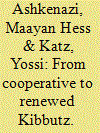| Srl | Item |
| 1 |
ID:
105434


|
|
|
|
|
| Publication |
2011.
|
| Summary/Abstract |
The article analyzes the place of kibbutz children's literature in the internal kibbutz discourse during the fervent 1940s and 1950s. During this era, all kibbutz movements implemented the principle of communal sleeping of children and youths, before the gradual erosion and decline of this fundamental principle of Communal Upbringing began. Kibbutz children's literature of this period has often been regarded as a tool for reinforcing collective kibbutz values, as taught by the various institutions of communal upbringing. The article investigates a parallel role that kibbutz children's literature has played, with subversive undercurrents. I demonstrate that alongside the expected glorification of communal ideology, some texts also evoked deliberations and frustrations-at times even piercing criticism-regarding the principles of communal upbringing, especially the marginalization of the family institution. It presents and analyzes several key children's books published in the 1940s and 1950s by the two kibbutz publishing houses: Kibbutz Meuhad and Sifriyat Poalim, all of which have been published in several editions.
|
|
|
|
|
|
|
|
|
|
|
|
|
|
|
|
| 2 |
ID:
090402


|
|
|
|
|
| Publication |
2009.
|
| Summary/Abstract |
This article deals with the process of change which is taking place in the kibbutz movement of Israel, and the structural and organizational changes in most kibbutzim from the model of a cooperative kibbutz to that of a renewed kibbutz. The article deals with the causes of the crisis and the principles of change, the essence of which is the implementation of the idea of economic rationalism. This change is not total nor is it accompanied by a denial of the fundamental values of kibbutz but it has many forms and takes place at different rates in accordance with the characteristics of each economic unit and each community. The research focuses on Kibbutz 'Galil' as a test case of a kibbutz which has undergone drastic change against the backdrop of a serious economic crisis and thus it represents an extreme example of a kibbutz which has moved completely to the model of a renewed kibbutz, constituting a signpost for other kibbutzim.
|
|
|
|
|
|
|
|
|
|
|
|
|
|
|
|
| 3 |
ID:
105432


|
|
|
|
|
| Publication |
2011.
|
| Summary/Abstract |
For one hundred years, the kibbutz was an undisputed model of an agricultural and industrial collective that implemented sharing, equality, and direct democracy among its members. Since the mid-1980s, however, the majority of the kibbutzim have undergone far-reaching changes that re-examine basic premises. Observers ask whether this means that the kibbutz is gone forever. The article confronts this question on the basis of references to recent sociological investigations. It indeed appears that renewal has helped many kibbutzim from a sudden threat of economic and demographic catastrophe. As the analysis shows, this danger was escaped by abandoning patterns sanctified by decades of practice that were the very markers of kibbutz life. Yet, we also observe that the notion of "kibbutz" is still pertinent for describing that reality. At the same time, we also acknowledge that kibbutzim today represent a society at risk-not so much because of a threatening environment, but due to their dependence on themselves and their members. More than ever, the kibbutz experience is in the hands of its membership, and this singularizes both the uniqueness and the vulnerability of the kibbutz. One can easily find in these assessments a problématique that is significant for analyzing any pluralistic reality.
|
|
|
|
|
|
|
|
|
|
|
|
|
|
|
|
| 4 |
ID:
154501


|
|
|
|
|
| Summary/Abstract |
This article reveals how non-Jewish volunteers who joined kibbutzim in Israel in the early 1970s created a situation that brought about the establishment of an Israeli state conversion system. Contrary to the prevailing idea that issues related to non-Jewish immigrants and conversion became practical and urgent only from the 1990s on, the central argument in this article is that a structured conversion system had already been established 20 years earlier, as a result of the unique collaboration between the secular Kibbutz Movement and Chief Rabbi Shlomo Goren, who assisted non-Jewish volunteers to convert to Judaism. This collaboration proves the ability of religious and secular to cooperate in order to promote the preservation of Israel’s Jewish character, but also points out the difficulties involved in doing so, which reflect the tensions that still exist between religion and secularism in Israel.
|
|
|
|
|
|
|
|
|
|
|
|
|
|
|
|
| 5 |
ID:
154498


|
|
|
|
|
| Summary/Abstract |
This article studies a unique case of transition to capitalism that involves adjustment to money: the privatization of the Israeli kibbutz system. Kibbutz members in Israel had refrained from using money for decades. The bankruptcy of the kibbutz system compelled them to enter the national monetary economy in the 1990s, and they opened personal bank accounts. The findings show that this process increased the monetary base in Israel but not broader measures of the quantity of money. This suggests that kibbutz members exposed for the first time to paycheques and private bank accounts may initially tend to prefer tangible cash to deposits.
|
|
|
|
|
|
|
|
|
|
|
|
|
|
|
|